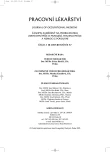-
Medical journals
- Career
Sildenafil for Treatment of Erectile Dysfunction in Men with Chronic Carbon Disulfide Intoxication*
Authors: I. Bátora 1; A. Orszag 1; J. Vrabec 2; D. Farkašová 3
Authors‘ workplace: Department of Industrial Medicine and Toxicology, School of Medicine Comenius University, Bratislava, Slovakia Head: Igor Batora, MD, PhD, Associate professor 1; Medical Sexology Institute, Bratislava, Slovakia, Head: Jan Vrabec, MD, PhD, Associate professor 2; Pfizer H. C. P. Slovakia 3
Published in: Pracov. Lék., 57, 2005, No. 2, s. 73-77.
Category: Original Papers
Overview
Occurrence of erectile dysfunction (ED) in viscose rayon workers with chronic carbon disulfide (CS₂) intoxication recognized as an occupational disease is well known. The aim of the study was to evaluate the efficacy of sildenafil in patients with ED attributable to chronic CS₂ intoxication. Seventeen men were former rayon workers with ED and chronic CS₂ intoxication recognized as an occupational disease. The sildenafil efficacy was assessed using the responses to questions according to the International Index of Erectile Function (IIEF). A positive response was recorded in all 17 patients. After treatment with sildenafil, a significant score difference was observed in all IIEF questions with the exception of Question 12 (rating of sexual desire). Moreover, the treatment with sildenafil significantly improved the ability to achieve and maintain an erection also in all subgroups of men with ED (age, duration of ED, duration of CS₂ exposure and antidepressant medication). Sildenafil was an effective, reliable, and well-tolerated treatment of erectile dysfunction in men with chronic carbon disulfide intoxication.
Key words:
sildenafil, erectile dysfunction, carbon disulfide
Labels
Hygiene and epidemiology Hyperbaric medicine Occupational medicine
Article was published inOccupational Medicine

2005 Issue 2-
All articles in this issue
- The Influence of Hyperbaric Oxygen Therapy on Biotransformation and Oxidative Stress in Patients with the Type II Diabetes Mellitus
- The Effect of Hyperbaric Oxygen Therapy in the Treatment of Chronic Unhealed Ulcers of Lower Extremities
- Sildenafil for Treatment of Erectile Dysfunction in Men with Chronic Carbon Disulfide Intoxication*
- Respiratory Allergic Diseases in Workers in Agriculture
- Smoking in Nurses
- The Method of a Total Body Cold Therapy
- Professional Stigmata
- Occupational Medicine
- Journal archive
- Current issue
- Online only
- About the journal
Most read in this issue- Professional Stigmata
- Smoking in Nurses
- Respiratory Allergic Diseases in Workers in Agriculture
- The Influence of Hyperbaric Oxygen Therapy on Biotransformation and Oxidative Stress in Patients with the Type II Diabetes Mellitus
Login#ADS_BOTTOM_SCRIPTS#Forgotten passwordEnter the email address that you registered with. We will send you instructions on how to set a new password.
- Career

